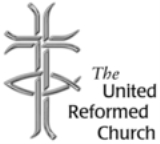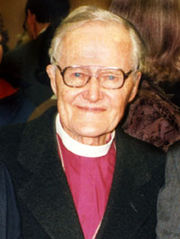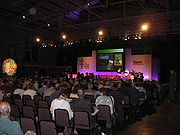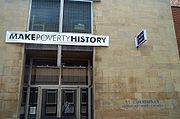
United Reformed Church
Encyclopedia
The United Reformed Church (URC) is a Christian
church in the United Kingdom
. It has approximately 68,000 members in 1,500 congregations with some 700 ministers.
The URC subsequently united with the Re-formed Association of Churches of Christ in 1981 and the Congregational Union of Scotland in 2000.
In 1982 the United Reformed Church voted in favour of a covenant with the Church of England, the Methodist Church and the Moravian Church, which would have meant remodelling its elders and moderators as bishops and incorporating its ministry into the apostolic succession. However, the Church of England rejected the covenant.
church whose theological roots are Calvinist and whose historical and organisational roots are in the Presbyterian (Reformed
), Congregational
and Churches of Christ traditions. Its Basis of Union contains "A statement concerning the nature, faith and order of the United Reformed Church", setting out its belief in a condensed form.
 The URC is governed by a combined form of presbyterian polity
The URC is governed by a combined form of presbyterian polity
and congregationalist polity
.
) which advises the Church Meeting and shares with the minister the spiritual and pastoral oversight of the church. Elders
are normally elected to serve for a specific period of time.
Within the present structures, congregations are able to manage themselves and arrange their services as they choose, reflecting their circumstances and preferences. As a result, congregations, even neighbouring ones, may have quite different characters, types of service and eligibility for communion
.
Congregations, through the Church Meeting, are responsible for the selection (issue of a "call") of ministers to fill vacancies. They also select Elders from within the membership and accept new members.
. There are 11 English synods, roughly corresponding to each region of England, one in Scotland
and one in Wales
; each is served by a moderator. The synod and its committees provide oversight within the framework of presbyterian polity
, giving pastoral care
and making important decisions about where ministers serve and how churches share ministry. Through the synods, the URC relates to other Christian denominations at a regional level such as Anglican dioceses. Synods usually hold property in trust
and make many key financial decisions. Synods have committees and employ staff to encourage and serve local churches.

 The URC has a General Assembly (led by a Moderator
The URC has a General Assembly (led by a Moderator
) which gathers representatives of the whole of the URC to meet biennially. Advised by the Mission Council, the General Assembly plans the activity of the URC across Great Britain and makes key policy decisions about the direction of the life of the denomination. It also appoints central staff (i.e. those responsible Britain-wide), receives reports from national committees, and deals with substantial reports and initiatives such as Vision4Life. The synods are represented along with the convenors of the Assembly's standing committees.
, Cytun
(Churches Together in Wales), the Enfys covenant, Action of Churches Together in Scotland
(ACTS) and Churches Together in Britain and Ireland
, the World Council of Churches
, the Conference of European Churches
, the Community of Protestant Churches in Europe
, the World Communion of Reformed Churches
and the Council for World Mission
.
Christian
A Christian is a person who adheres to Christianity, an Abrahamic, monotheistic religion based on the life and teachings of Jesus of Nazareth as recorded in the Canonical gospels and the letters of the New Testament...
church in the United Kingdom
United Kingdom
The United Kingdom of Great Britain and Northern IrelandIn the United Kingdom and Dependencies, other languages have been officially recognised as legitimate autochthonous languages under the European Charter for Regional or Minority Languages...
. It has approximately 68,000 members in 1,500 congregations with some 700 ministers.
Origins and history
The United Reformed Church results from a union of the Presbyterian Church of England and the Congregational Church in England and Wales in 1972. In introducing the United Reformed Church Bill in the House of Commons on 21 June 1972, Alexander Lyon called it "one of the most historic measures in the history of the Christian churches in this country".The URC subsequently united with the Re-formed Association of Churches of Christ in 1981 and the Congregational Union of Scotland in 2000.
In 1982 the United Reformed Church voted in favour of a covenant with the Church of England, the Methodist Church and the Moravian Church, which would have meant remodelling its elders and moderators as bishops and incorporating its ministry into the apostolic succession. However, the Church of England rejected the covenant.
Belief
The URC is a trinitarianTrinity
The Christian doctrine of the Trinity defines God as three divine persons : the Father, the Son , and the Holy Spirit. The three persons are distinct yet coexist in unity, and are co-equal, co-eternal and consubstantial . Put another way, the three persons of the Trinity are of one being...
church whose theological roots are Calvinist and whose historical and organisational roots are in the Presbyterian (Reformed
Reformed churches
The Reformed churches are a group of Protestant denominations characterized by Calvinist doctrines. They are descended from the Swiss Reformation inaugurated by Huldrych Zwingli but developed more coherently by Martin Bucer, Heinrich Bullinger and especially John Calvin...
), Congregational
Congregational church
Congregational churches are Protestant Christian churches practicing Congregationalist church governance, in which each congregation independently and autonomously runs its own affairs....
and Churches of Christ traditions. Its Basis of Union contains "A statement concerning the nature, faith and order of the United Reformed Church", setting out its belief in a condensed form.
Polity

Presbyterian polity
Presbyterian polity is a method of church governance typified by the rule of assemblies of presbyters, or elders. Each local church is governed by a body of elected elders usually called the session or consistory, though other terms, such as church board, may apply...
and congregationalist polity
Congregationalist polity
Congregationalist polity, often known as congregationalism, is a system of church governance in which every local church congregation is independent, ecclesiastically sovereign, or "autonomous"...
.
Congregation
Each congregation (local church) within the URC is governed by a Church Meeting consisting of all its members, which is the ultimate decision-making body in the congregation. There is also an Elders' Meeting (similar to the presbyterian Kirk Session in the Church of ScotlandChurch of Scotland
The Church of Scotland, known informally by its Scots language name, the Kirk, is a Presbyterian church, decisively shaped by the Scottish Reformation....
) which advises the Church Meeting and shares with the minister the spiritual and pastoral oversight of the church. Elders
Elder (Christianity)
An elder in Christianity is a person valued for his wisdom who accordingly holds a particular position of responsibility in a Christian group. In some Christian traditions an elder is a clergy person who usually serves a local church or churches and who has been ordained to a ministry of Word,...
are normally elected to serve for a specific period of time.
Within the present structures, congregations are able to manage themselves and arrange their services as they choose, reflecting their circumstances and preferences. As a result, congregations, even neighbouring ones, may have quite different characters, types of service and eligibility for communion
Eucharist
The Eucharist , also called Holy Communion, the Sacrament of the Altar, the Blessed Sacrament, the Lord's Supper, and other names, is a Christian sacrament or ordinance...
.
Congregations, through the Church Meeting, are responsible for the selection (issue of a "call") of ministers to fill vacancies. They also select Elders from within the membership and accept new members.
Synod
At a regional level, representatives of the congregations assemble in a synodSynod
A synod historically is a council of a church, usually convened to decide an issue of doctrine, administration or application. In modern usage, the word often refers to the governing body of a particular church, whether its members are meeting or not...
. There are 11 English synods, roughly corresponding to each region of England, one in Scotland
Scotland
Scotland is a country that is part of the United Kingdom. Occupying the northern third of the island of Great Britain, it shares a border with England to the south and is bounded by the North Sea to the east, the Atlantic Ocean to the north and west, and the North Channel and Irish Sea to the...
and one in Wales
Wales
Wales is a country that is part of the United Kingdom and the island of Great Britain, bordered by England to its east and the Atlantic Ocean and Irish Sea to its west. It has a population of three million, and a total area of 20,779 km²...
; each is served by a moderator. The synod and its committees provide oversight within the framework of presbyterian polity
Presbyterian polity
Presbyterian polity is a method of church governance typified by the rule of assemblies of presbyters, or elders. Each local church is governed by a body of elected elders usually called the session or consistory, though other terms, such as church board, may apply...
, giving pastoral care
Pastoral care
Pastoral care is the ministry of care and counseling provided by pastors, chaplains and other religious leaders to members of their church or congregation, or to persons of all faiths and none within institutional settings. This can range anywhere from home visitation to formal counseling provided...
and making important decisions about where ministers serve and how churches share ministry. Through the synods, the URC relates to other Christian denominations at a regional level such as Anglican dioceses. Synods usually hold property in trust
Escrow
An escrow is:* an arrangement made under contractual provisions between transacting parties, whereby an independent trusted third party receives and disburses money and/or documents for the transacting parties, with the timing of such disbursement by the third party dependent on the fulfillment of...
and make many key financial decisions. Synods have committees and employ staff to encourage and serve local churches.
General Assembly


Moderator of the General Assembly
The Moderator of the General Assembly is the chairperson of a General Assembly, the highest court of a presbyterian or reformed church. Kirk Sessions and Presbyteries may also style the chairperson as moderator....
) which gathers representatives of the whole of the URC to meet biennially. Advised by the Mission Council, the General Assembly plans the activity of the URC across Great Britain and makes key policy decisions about the direction of the life of the denomination. It also appoints central staff (i.e. those responsible Britain-wide), receives reports from national committees, and deals with substantial reports and initiatives such as Vision4Life. The synods are represented along with the convenors of the Assembly's standing committees.
Ecumenism
The URC is a member of many ecumenical organisations including Churches Together in EnglandChurches Together in England
Churches Together in England is an ecumenical organisation and the national instrument for the Christian church in England. It helps the different Churches to work together instead of separately so that they can be more effective and credible...
, Cytun
Cytûn
Cytûn is the ecumenical Christian organisation of Churches Together in Wales. It was formed in 1990 and is the successor of the former Council of Churches for Wales. The office is located in Richmond Road, Cardiff...
(Churches Together in Wales), the Enfys covenant, Action of Churches Together in Scotland
Action of Churches Together in Scotland
Action of Churches Together in Scotland is a national ecumenical organisation of churches in Scotland, founded in 1990. It is the successor to the former Scottish Council of Churches...
(ACTS) and Churches Together in Britain and Ireland
Churches Together in Britain and Ireland
Churches Together in Britain and Ireland is an ecumenical organisation. The members include most of the major churches in England, Scotland, Wales and Ireland. It was formerly known as the Council of Churches of Britain and Ireland...
, the World Council of Churches
World Council of Churches
The World Council of Churches is a worldwide fellowship of 349 global, regional and sub-regional, national and local churches seeking unity, a common witness and Christian service. It is a Christian ecumenical organization that is based in the Ecumenical Centre in Geneva, Switzerland...
, the Conference of European Churches
Conference of European Churches
The Conference of European Churches was founded in 1959 to promote reconciliation, dialogue and friendship between the churches of Europe at a time of growing Cold War political tensions and divisions. It is an ecumenical fellowship of Christian churches in Europe; its membership consists of most...
, the Community of Protestant Churches in Europe
Leuenberg Agreement
Leuenberg Agreement is an ecumenical document adopted in 1973 by major European Lutheran and Reformed churches at the Swiss conference centre Leuenberg . Under this agreement the churches agree on a common understanding of the Gospel, including elementary agreement on important doctrines including...
, the World Communion of Reformed Churches
World Communion of Reformed Churches
The World Communion of Reformed Churches is an ecumenical Christian body formed in June 2010 by the union of the World Alliance of Reformed Churches and the Reformed Ecumenical Council...
and the Council for World Mission
Council for World Mission
The Council for World Mission is a worldwide community of Christian churches. The 31 members share their resources of money, people, skills and insights to carry out their missionary work.CWM was established in 1977 in its present form...
.
Fellowship of United Reformed Youth
FURY is a body for young people aged 11–25 within the United Reformed Church.See also
- ReformReform (magazine)Reform, also referred to as Reform Magazine, is an editorially-independent monthly subscription magazine published by the United Reformed Church....
magazine - English Presbyterian MissionEnglish Presbyterian MissionEnglish Presbyterian Mission was a British Presbyterian missionary society that was involved in sending workers to countries such as China during the late Qing Dynasty.-English Presbyterian Mission work in China:...
- Religion in the United KingdomReligion in the United KingdomReligion in the United Kingdom and the states that pre-dated the UK, was dominated by forms of Christianity for over 1,400 years. Although a majority of citizens still identify with Christianity in many surveys, regular church attendance has fallen dramatically since the middle of the 20th century,...
- United Reformed Church Guide and Scout FellowshipUnited Reformed Church Guide and Scout FellowshipThe United Reformed Church Guide and Scout Fellowship is a national fellowship in the United Kingdom that works with members of Guide and Scout groups who are affiliated with the United Reformed Church, as well as members of the United Reformed Church who have an interest in Guiding or Scouting...
- United and uniting churchesUnited and uniting churchesUnited and uniting churches are churches formed from the merger or other form of union of two or more different Protestant denominations.Perhaps the oldest example of a united church is found in Germany, where the Evangelical Church in Germany is a federation of Lutheran, United and Reformed...
External links
- United Reformed Church official website
Polity information
- The Basis of Union A statement concerning the nature, faith and order of the United Reformed Church
- The Structure of the United Reformed Church
- United Reformed Church Act 2000 The 1972 and 1981 Acts are not available at Her Majesty's Stationery Office website
Organisations for young people
- Fellowship of United Reformed Youth (FURY) official website
- Pilots (children's organisation)
- The United Reformed Church Guide and Scout Fellowship (URCGSF)
Internal groupings
- Group for Evangelism and Renewal within the URC (GEAR)
- Free to Believe: an informal network of liberally minded members of the United Reformed Church

